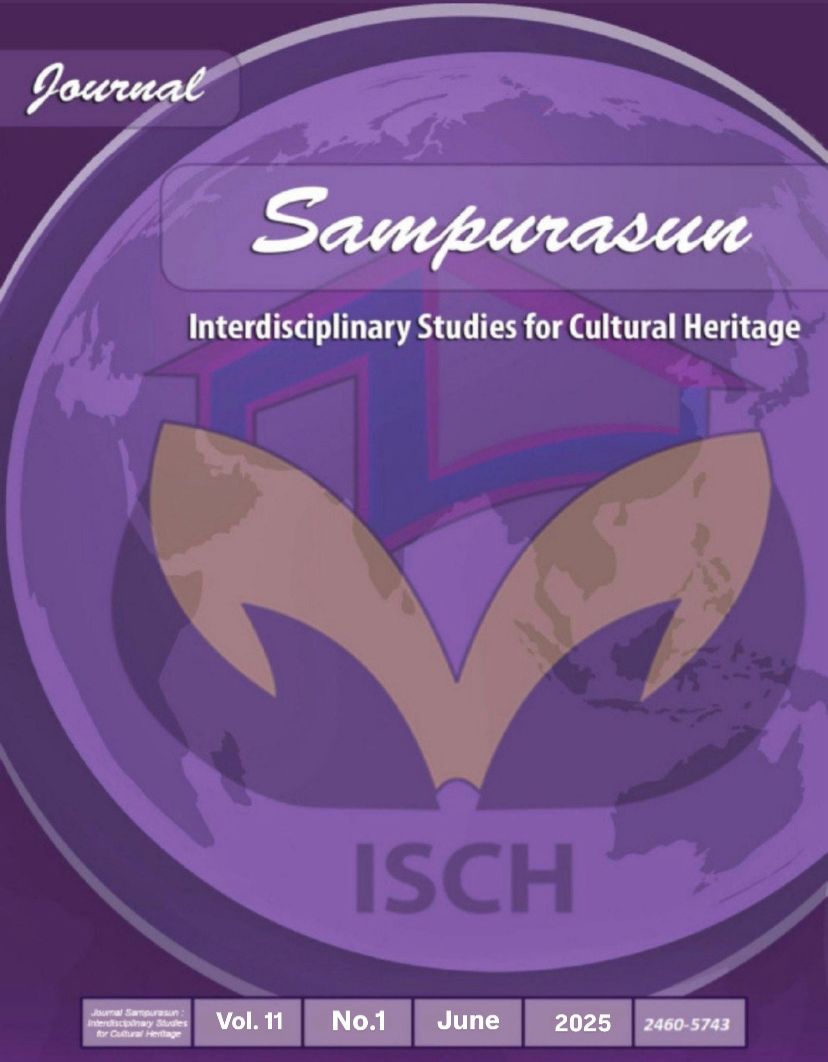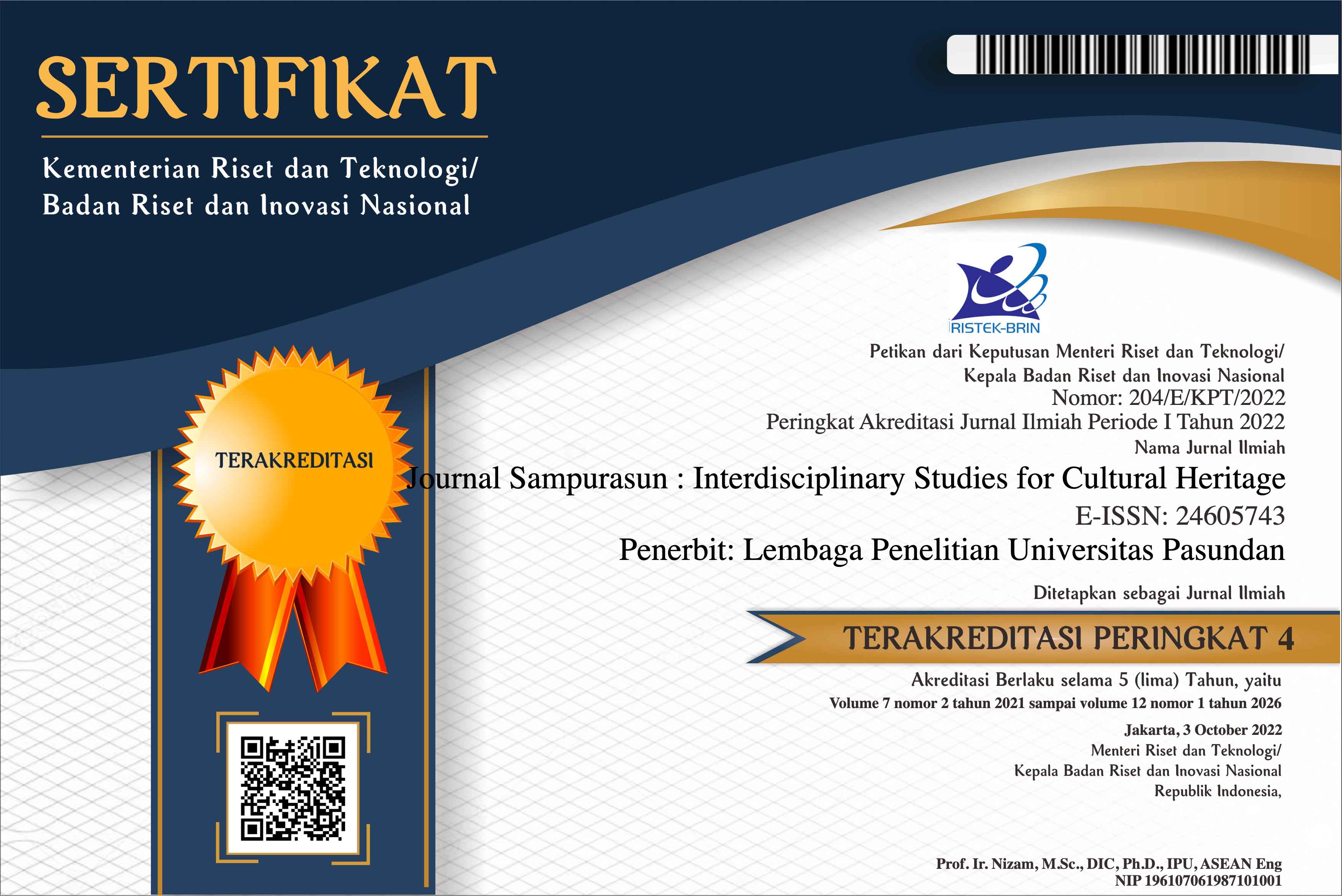THE ROLE OF SOCIAL WORKER AT SUB-DISTRICT LEVEL IN STRENGTHENING ENTREPRENEURSHIP OF KUBE TO OVERCOME CULTURAL POVERTY
DOI:
https://doi.org/10.23969/sampurasun.v11i1.24074Keywords:
Cultural Poverty, Home Business, KUBE, Entrepreneurship, Social WorkerAbstract
The Ministry of Social Affairs implemented the KUBE (Kelompok Usaha Bersam) or
known as micro business group which is managed and owned by beneficiaries of the Family
Hope Program/Program Keluarga Harapan (PKH) by developing home business. This
activity is accompanied by social work in sub district level under the coordination of Board
of Social Service Regency with the duties and roles as person in charge during
implementing the program for strengthening their entrepreneurship spirit so that they do
not depend anymore on public assistance, this dependency is a manifestation of the culture
of poverty. The aim is to describe the role of social work in strengthening entrepreneurship
of KUBE. Research method used qualitative and data collection through interview. Data
analysis used SWOT analysis to discover the appropriate strategy. The results showed that
the role of social work in business supervising as an enabler, broker, mediator and educator
need to be improved. The recommendation goes to institution related to KUBE
development, higher education, community agent and Corporate Social Responsibility
Program to strengthen the knowledge of social worker in micro business to improve spirit
of social entrepreneurship and their business management. The role of social worker was
very important to break cultural barrier in business development.
Keywords: Cultural Poverty, Home Business, KUBE, Entrepreneurship, Social Worker
Downloads
References
Achmad et.al (2021). Community Empowerment-Based Corporate Social Responsibility
Program in Panglima Raja Village. International Journal on Social Science,
Economics and Art, 11(1).
Ananta, M., & Cholid, S. (2019). Pengaruh Proses Pendampingan Sosial Tenaga
Kesejahteraan Sosial Kecamatan (TKSK) Terhadap Pencapaian Tujuan Kelompok
Usaha Bersama Fakir Miskin (KUBE-FM) Di Kota Jambi. Jurnal Ilmiah Kebijakan
Dan Pelayanan Pekerjaan Sosial, 01(1).
Astuti & Andayani,
Anwar, A., & Firdaus, M. (2019). Pengaruh Kelompok Usaha Bersama (KUBE) terhadap
Pemberdayaan Ekonomi Masyarakat di Pedesaan. Jurnal Agribisnis Indonesia, 7(2),
130–138.
Creswell, J. W. (2015). Research Design Pendekatan Kualitatif, Kuantitatif dan mixed.
Dinas Sosial Provinsi Jawa Barat Petunjuk Pelaksanaan dan Petunjuk Teknik KUBE.
(2023). Petunjuk Pelaksanaan dan Petunjuk Teknik KUBE. Dinas Sosial Provinsi
Jawa Barat: Bandung.
Dini Nadila, U. H. (2022). Analisis Kebijakan Kementrian Sosial Tentang Program
Kewirausahaan Sosial di Kecamatan Cilebar Kabupaten Karawang, Jurnal Ilmu
Kesejahteraan Sosial “Humanitas” Fisip Unpas, Volume IV, Nomor II.
Economic Planning Unit: Twelfth Malaysian Plan. 2019. [accessed 20 December
2020]. Reference Source
Fitria, M., & Fachrurozi, M. (2023). Faktor Keberhasilan Program Kelompok Usaha
Bersama. Journal of Innovation in Management, Accounting and Business, 2(1), 34
40.
Golubovskaya, M., Solnet, D., & Robinson, R. N. (2019). Recalibrating talent management
for hospitality: a youth development perspective. International Journal of
Contemporary
Hospitality Management. 31(10):4105–4125. 10.1108/IJCHM-11-2018-0911 [CrossRef] [Google Scholar]
Harris, John. 2003. The Social Work Business. London: Routledge
Jones, Gareth, R. & George, Jennifer M. 2007. Essential of Contemporary Management.
New York: Mc Graw Hill.
Jung, D.I. & Sosik, J.J., 2002. Transformational Leadership in Work Groups: The Role of
Empowerment, Cohesiveness, and Collective-Efficacy on Perceived Group
Performance. Small Group Research, 33(3), pp.313–336.
Mathieu, J.E., Gilson, L.L. & Ruddy, T.M., 2006. Empowerment and team effectiveness:
an empirical test of an integrated model. The Journal of applied psychology, 91(1),
pp.97–108.
Naudé, Wim; Wikman, Anders; Lambiri, Dionysia; Biagi, Bianca; Royuela, Vicente;
Klaveren, Chris; Brink, Chinese University of Hong Kong; Cheung, Chau-kiu;
Leung, Kwan-kwok; Rosenthal, Anne Doreen; Russell, Jean; Thomson, Garry;
Madheswaran, S; Romano, M.. 2010. Entrepreneurship, developing countries, and
development economics: new approaches and insights. International Bibliography of
the Social Sciences (IBSS), 34(1), pp.1–12.
Journal Sampurasun: Interdisciplinary Studies for Cultural Heritage
Vol. 11, Number 1, June 2025
Malaysia, P. M. (2012). Tenth Malaysia Plan: 2011-2015 (No. id: 4921). [accessed 14 July
2022]
Mohd, H., Mohd, Y. H., & Zaimah, R. (2018). AzAM Tani programme to provide
secondary income
for poor household in Seberang Perai, Pulau Pinang.
Geografia. Malaysian Journal of Society and Space, 14(2), 151-160.
Nair, S. (2010). Moving forward: Its poverty agenda challenges, dilemmas and options for
Malaysia.
Centre for Poverty and Development Studies (CPDS), University
of Malaya, Kuala Lumpur:
Malaysia.
Nisjar, K., & Winardi. (1997). Manajemen Strategik. Mandar Maju.
Percetakan Nasional Malaysia Berhad: Shared prosperity vision 2030: Restructuring the
priorities of
Malaysia’s development. [accessed 14 July 2022]
Rahmawati, E., & Kisworo, B. (2017). Peran Pendamping dalam Pemberdayaan
Masyarakat Miskin melalui Program Keluarga Harapan. Journal of Nonformal
Education and Community Ilmu Empowerment, 1(2), 161–169. https://doi.org/10.15294/pls.v1i2.16271
Rohatynskyj. 2011. Development discourse and selling soap in Madhya Pradesh, India.
Human Organization, 70 (1) (2011), pp. 63-73
Ridley-Duff, R., 2008. Social enterprise as a socially rational business. International
Journal of Entrepreneurial Behaviour and Research, 14(5), pp.291–312. Available
at: http://shura.shu.ac.uk/724/.
Robbins, Stephen, P & Coulter, Mary 2007. Alih Bahasa Harry Slamet. Manajemen.
Jakarta: PT.Indeks.
Sariningsih Yuce, Anwar Ali, Mardlhiyah Aisyah Hasna, Margaretha Angelic. 2024.
Value Based Management at Kelompok Usaha Bersama (KUBE). Journal
Sampurasun. https://doi.org/10.23969/sampurasun.v10i1.13340
Silvia, & Sujianto, S. (2022). Efektivitas Kelompok Usaha Bersama (KUBE) di Desa
Banglas Kecamatan Tebing Tinggi Kabupaten Kepulauan Meranti. PUBLIKA : Jurnal Administrasi Publik, 7(2), 227–239. https://doi.org/10.25299/jiap.2021.vol7(2).7185
Sugiyanto dan Suradi. 2020. Peranan Penyuluh Sosial Masyarakat Sebagai Agen
Perubahan dalam Pengembangan Masyarakat Lokal: Kasus Kota Banjarmasin. Sosio Konsepsia. Vol. 9, No. 02. Suradi. 2012. Pendekatan Kelompok Sebagai Modalitas dalam Penanggulangan
Kemiskinan. Sosio Informa. Vo. 17 No 2 (2012).
https://doi.org/10.33007/inf.v17i2.93
Tampubolon Joyakin, Sugihen Basita Ginting, Slamet Margono, Susanto Djoko dan
Sumardjo, Jurnal Penyuluhan, Juni 2006, Vol. 2, No. 2.
William, D, B., & Zacharakis, A. 2011. Entrepreneurship, 2nd Edition. New York: John
Wiley & Sons, Inc.
Easy Sociology. 2024. Understanding the Concept of the “Culture of Poverty” in
Sociology.
Additional Files
Published
Issue
Section
License
Copyright (c) 2025 Journal Sampurasun : Interdisciplinary Studies for Cultural Heritage

This work is licensed under a Creative Commons Attribution 4.0 International License.
Copyright Notice
Authors should not withdraw their submitted papers because the withdrawal wastes voluntary works devoted by an associate editor and reviewers. But, we accept the withdrawal of a submitted paper if authors have unavoidable reasons. In the event that a manuscript is to be withdrawn from submission to Sampurasun Journal, a letter must be sent to the editorial office requesting withdrawal by e-mail (sampurasunjournal@unpas.ac.id) with its scanned PDF file, before the notification of acceptance for publication.
The withdraw request letter must include the following information. Paper ID, Paper title, Authors names, Reason why the paper must be withdrawn, and Date and signatures of all the authors (or signature of the contact author).
If only the contact author signs the letter, he/she must obtain the agreement of the withdrawal from all the other authors and the letter must include the description that all the other authors agreed the withdrawal. The journal will not withdraw a manuscript from peer review until such a letter has been received. Authors must not assume their manuscript has been withdrawn until they have received appropriate notification from the editorial office. Withdrawal of a manuscript subsequent to acceptance for publication will only be granted in the most exceptional of circumstances.
After the paper is accepted for publication, the withdrawal is not permitted in principle. The authors must always pay the charge even if the withdrawal is permitted. Any request of withdrawal that does not follow the above procedure is treated as invalid. If illegal submission, e.g., plagiarized or duplicate submission, is found for a paper, the withdrawal of the paper will never be permitted and the authors will be punished based on the rule. It is not acceptable practice to withdraw a manuscript in the event of acceptance at another journal. This constitutes dual submission. The editorial office of the other journal will be notified of your actions. In such circumstances Sampurasun ISCH may chose to impose appropriate punitive action subject.
Withdrawal Penalty
Author is not allowed to withdraw submitted manuscripts, because the withdrawal is waste of valuable resources that editors and referees spent a great deal of time processing submitted manuscript, money and works invested by the publisher. If author still requests withdrawal of his/her manuscript when the manuscript is still in the peer-reviewing process, author will be punished with paying $200 per manuscript, as withdrawal penalty to the publisher. However, it is unethical to withdraw a submitted manuscript from one journal if accepted by another journal. The withdrawal of manuscript after the manuscript is accepted for publication, author will be punished by paying US$500 per manuscript. Withdrawal of manuscript is only allowed after withdrawal penalty has been fully paid to the Publisher. If author don't agree to pay the penalty, the author and his/her affiliation will be blacklisted for publication in this journal. Even, his/her previously published articles will be removed from our online system.


















